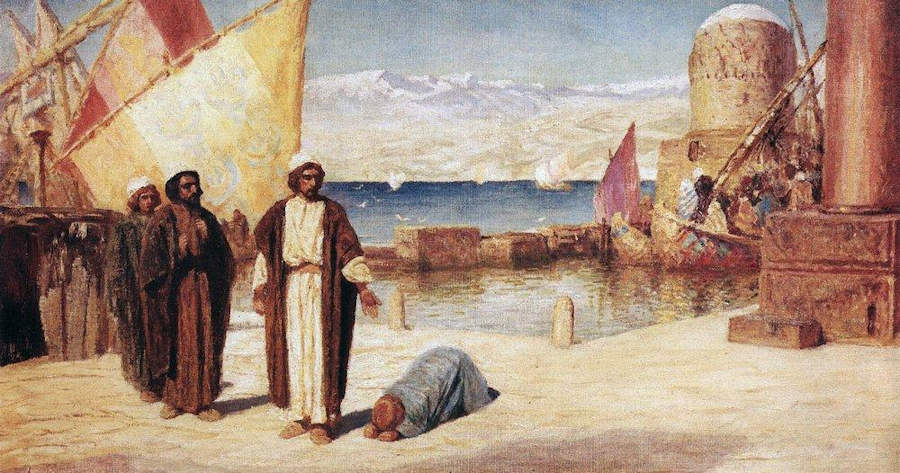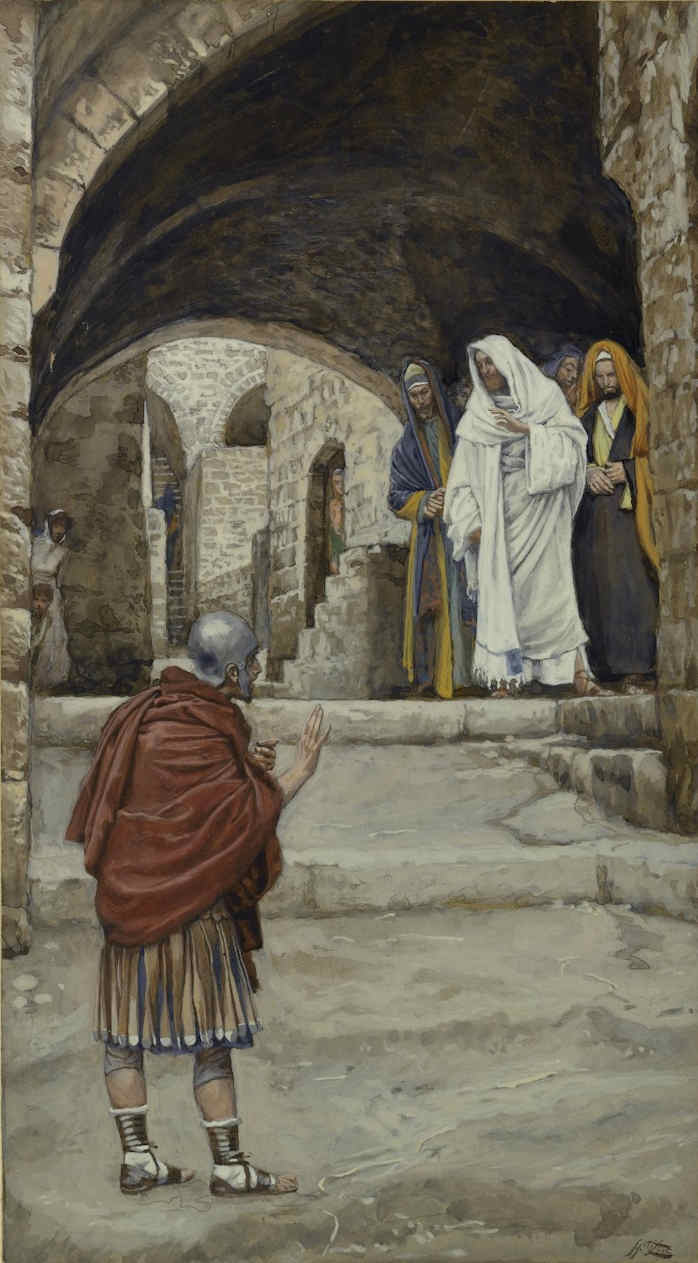“‘It is too small a thing that You should be My Servant
to raise up the tribes of Jacob, and to restore the preserved ones of Israel;
I will also give You as a light to the Gentiles,
that You should be My salvation to the ends of the earth.’”
(Isaiah 49:6.)
“Then I will sow her for Myself in the earth, and I will have mercy on her who had not obtained mercy; then I will say to those who were not My people, ‘You are My people!’ And they shall say, ‘You are my God!’”” (Hosea 2:23)
“Now it shall come to pass in the latter days
that the mountain of the LORD’S house
shall be established on the top of the mountains,
and shall be exalted above the hills;
and peoples shall flow to it.
Many nations shall come and say,
‘Come, and let us go up to the mountain of the LORD,
to the house of the God of Jacob;
He will teach us His ways,
and we shall walk in His paths.’
For out of Zion the law shall go forth,
and the word of the LORD from Jerusalem.
He shall judge between many peoples,
and rebuke strong nations afar off;
they shall beat their swords into plowshares,
and their spears into pruning hooks;
nation shall not lift up sword against nation,
neither shall they learn war anymore.” (Micah 4:1-3.)
““Rejoice greatly, O daughter of Zion! Shout, O daughter of Jerusalem! Behold, your King is coming to you; He is just and having salvation, lowly and riding on a donkey,a colt, the foal of a donkey.
I will cut off the chariot from Ephraim and the horse from Jerusalem; the battle bow shall be cut off. He shall speak peace to the nations; His dominion shall be ‘from sea to sea, and from the River to the ends of the earth.’” (Zechariah 9:9-11).
“Now it shall come to pass in the latter days
that the mountain of the LORD’S house
shall be established on the top of the mountains,
and shall be exalted above the hills;
and all nations shall flow to it.
Many people shall come and say,
‘Come, and let us go up to the mountain of the LORD,
to the house of the God of Jacob;
He will teach us His ways,
and we shall walk in His paths.’ For out of Zion shall go forth the law,
and the word of the LORD from Jerusalem.
He shall judge between the nations,
and rebuke many people;
They shall beat their swords into plowshares,
and their spears into pruning hooks;
nation shall not lift up sword against nation,
neither shall they learn war anymore.” (Isaiah 2:2-4).
“Behold! My Servant whom I uphold,
My Elect One in whom My soul delights!
I have put My Spirit upon Him;
He will bring forth justice to the Gentiles.
He will not cry out, nor raise His voice,
Nor cause His voice to be heard in the street.
A bruised reed He will not break,
And smoking flax He will not quench;
He will bring forth justice for truth.
He will not fail nor be discouraged,
Till He has established justice in the earth;
And the coastlands shall wait for His law.”
(Isaiah 42:1-4.)
“He shall have dominion also from sea to sea, and from the River to the ends of the earth.
Those who dwell in the wilderness will bow before Him, and His enemies will lick the dust.
The kings of Tarshish and of the isles will bring presents; the kings of Sheba and Seba will offer gifts.
Yes, all kings shall fall down before Him; all nations shall serve Him.” (Psalm 72:8-11).
“Look to Me, and be saved, all you ends of the earth! For I am God, and there is no other.
I have sworn by Myself; the word has gone out of My mouth in righteousness, and shall not return, that to Me every knee shall bow, every tongue shall take an oath.” (Isaiah 45:22-23).
“Indeed I have given him as a witness to the people, a leader and commander for the people.
Surely you shall call a nation you do not know, and nations who do not know you shall run to you,
because of the Lord your God, and the Holy One of Israel; for He has glorified you.” (Isaiah 55:4-5)
“Also the sons of the foreigner who join themselves to the Lord, to serve Him, and to love the name of the Lord, to be His servants — everyone who keeps from defiling the Sabbath, and holds fast My covenant —
even them I will bring to My holy mountain, and make them joyful in My house of prayer. Their burnt offerings and their sacrifices will be accepted on My altar; for My house shall be called a house of prayer for all nations.” (Isaiah 56:6-7).
“All nations whom You have made
shall come and worship before You, O Lord,
and shall glorify Your name.” (Psalm 86:9).
“And in this mountain the Lord of hosts will make for all people a feast of choice pieces, a feast of wines on the lees, of fat things full of marrow, of well-refined wines on the lees.
And He will destroy on this mountain the surface of the covering cast over all people, and the veil that is spread over all nations.” (Isaiah 25:6-7).
“All the ends of the world
shall remember and turn to the LORD,
and all the families of the nations
shall worship before You.
For the kingdom is the LORD’S,
and He rules over the nations.” (Psalm 22:27-28).
“Arise, O God, judge the earth: for thou shalt inherit all nations.” (Psalm 82:8).
“God reigns over the nations;
God sits on His holy throne.
The princes of the people have gathered together,
The people of the God of Abraham.
For the shields of the earth belong to God;
He is greatly exalted.” (Psalm 47:8-9).
“God be merciful to us and bless us, and cause His face to shine upon us, Selah
That Your way may be known on earth, Your salvation among all nations.
Let the peoples praise You, O God; let all the peoples praise You.
Oh, let the nations be glad and sing for joy! For You shall judge the people righteously, and govern the nations on earth.” (Psalm 67:1-4)
“‘On that day I will raise up
The tabernacle of David, which has fallen down,
and repair its damages;
I will raise up its ruins,
and rebuild it as in the days of old;
that they may possess the remnant of Edom,
and all the Gentiles who are called by My name,’
says the LORD who does this thing.” (Amos 9:11-12).
“Therefore I will give thanks to You, O Lord, among the Gentiles, and sing praises to Your name.” (2 Samuel 22:50, Psalm 18:49).
“Rejoice, O Gentiles, with His úpeople; for He will avenge the blood of His servants, and render vengeance to His adversaries; He will provide atonement for His land and His people.” (Deteronomy 32:43).
“I saw in the night visions, and, behold, one like the Son of man came with the clouds of heaven, and came to the Ancient of days, and they brought him near before him. And there was given him dominion, and glory, and a kingdom, that all people, nations, and languages, should serve him: his dominion is an everlasting dominion, which shall not pass away, and his kingdom that which shall not be destroyed.” (Daniel 7:13-14)
“And in that day there shall be a root of Jesse, which shall stand for an ensign of the people; to it shall the Gentiles seek: and his rest shall be glorious.” (Isaiah 11:10)
“The Gentiles shall come to your light,
and kings to the brightness of your rising.” (Isaiah 60:3).
“For then I will restore to the peoples a pure language,
that they all may call on the name of the LORD,
to serve Him with one accord.
From beyond the rivers of Ethiopia
My worshipers,
the daughter of My dispersed ones,
shall bring My offering.” (Zephaniah 3:9-10).
“Praise the LORD, all you Gentiles! Laud Him, all you peoples!” (Psalm 117:1)
“‘Sing and rejoice, O daughter of Zion! For behold, I am coming and I will dwell in your midst,’
says the LORD. ‘Many nations shall be joined to the LORD in that day, and they shall become My people. And I will dwell in your midst.’
Then you will know that the LORD of hosts has sent Me to you.’” (Zechariah 2:10-11).
“O LORD, my strength and my fortress,
My refuge in the day of affliction,
the Gentiles shall come to You
from the ends of the earth and say,
‘Surely our fathers have inherited lies,
Worthlessness and unprofitable things.’” (Jeremiah 16:19).
“Thus says the LORD of hosts:
‘Peoples shall yet come,
inhabitants of many cities;
The inhabitants of one city shall go to another, saying,
“Let us continue to go and pray before the LORD,
and seek the LORD of hosts.
I myself will go also.”
Yes, many peoples and strong nations
shall come to seek the LORD of hosts in Jerusalem,
and to pray before the LORD.’
“Thus says the LORD of hosts: ‘In those days ten men from every language of the nations shall grasp the sleeve of a Jewish man, saying, “Let us go with you, for we have heard that God is with you.”’” (Zechariah 8:20-23).
“‘For from the rising of the sun, even to its going down,
My name shall be great among the Gentiles;
in every place incense shall be offered to My name,
and a pure offering;
for My name shall be great among the nations,’
says the LORD of hosts.”
(Malachi 1:11).



